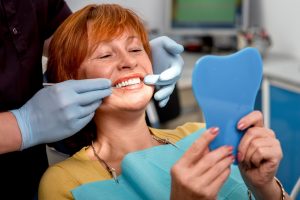 Dr. Bowers Answers Your Denture Questions
Dr. Bowers Answers Your Denture Questions
What are dentures?
Dentures are a type of prosthesis, along with crowns, bridges and dental implants.
All of these have advantages and disadvantages, and your prosthodontist will be able to discuss all the possible treatments for your specific needs.
I think I need dentures. What should I do next?
The most important conversation you need to have is with a Prosthodontist: a professional who has trained as a dentist and then studied for three more years to specialize in restoring or replacing missing teeth.
Also: It is very important when thinking about getting dentures that your mouth is healthy. Gum disease can be a contributing factor to teeth falling out. If you have gum disease, you will need to have it treated. For Gum Disease treatment we suggest Envision Dental.
Full – Complete dentures
There are two types. A “full” or “complete” denture is used when all of your teeth need to be replaced. They are supported entirely by the outside edge of your gums.
Partial Dentures
Dentures that are needed to replace only some of your teeth are called “partial” dentures. They are attached to existing teeth, rather than requiring full support from the gums. For both complete and partial dentures, dental implants (artificial teeth that are permanently, surgically attached to your jaw) can add support and stability.
How to clean dentures?
Dentures are made from plastic or acrylic, so they can’t be lightened, and are vulnerable to the same plaque bacteria and food residue that stain natural teeth. To avoid discoloring, dentures should be cleaned daily. You should purchase a soft toothbrush or specialized denture brush, and denture paste or non-abrasive toothpaste. Gently but thoroughly scrub all surfaces of the denture and soak overnight in a dentist-recommended fluid.
How to whiten dentures?
When it comes to removing stains, or to whiten your dentures a number of specialized products are available in pharmacies, but be very careful to follow their instructions precisely; if the cleaner uses any kind of bleach, check with your dental professional before trying it. They may approve the product or even suggest highly diluted ordinary bleach. You will probably need serious stains treated at their office.
Ordinary toothpaste is bad for dentures. Natural teeth can stand up to the micro-abrasives and whitening chemicals found it regular toothpaste, but dentures cannot. The plastic in dentures is very durable, but its surfaces are still more vulnerable than tooth enamel. Specially designed cleaning products and brushes are safest.
What should I do if a denture breaks?
A cracked or damaged denture means you should visit your prosthodontist for repair. Even if the damage looks simple, badly mended dentures can harm your gums and affect your ability to chew. If an older denture is cracked, it could need to be reshaped or replaced; the only way to know this is to take it to a professional.
At Sweet Comfort Dentures we can take care of denture repairs for you, we have our very own in-house Denture Repair Lab in Port Orange.
How important is having an in-house denture repair lab?
At Sweet Comfort Dentures we feel having an in-house denture repair lab is very important because it allows us to offer the most precise adjustments all while saving valuable time.
How long can i leave my dentures out?
It’s possible to leave your dentures overnight, but it is important to clean them every single day. If dentures need to be worn when you sleep for appearance or because your jaw becomes overly tense without them, you should take some time during the day to remove them, and thoroughly clean both the dentures and your mouth. They should never be worn for a full 24 hours, and it is really ideal to clean them at night and let them soak.
What should I know when it comes to chewing food?
It takes some time to get familiar with the feel and use of dentures. You may not feel able to feel that you can eat normally at first, but you should adapt before long. Particularly sticky or tough foods may take a little longer to eat totally comfortably. While you adjust, it may help to use a little bit of adhesive for dentures; use only 1-2 small dabs on either side to feel like they’re fitting more firmly in your mouth.
Gum: chewing gum is made with resin, polymer and plastic-like ingredients. As a result, it is just not compatible with the plastic of dentures. It will tug on them in a way that normal foods do not, and can even stick, causing discoloration and rough spots. Unfortunately, gum and dentures are just not compatible.
Should I expect dentures to be painful?
When dentures are new, many people find the feeling of wearing them uncomfortable and you may have some soreness in your mouth. This varies from person to person. Newly fitted dentures should mean several visits to the prosthodontist office to make sure that you are healing and adapting the way you should be, and make any necessary tweaks.
It’s possible for some patients to have dentures fitted the same day as having a tooth pulled—called “immediate dentures.” A prosthodontist can tell you if this is an option for your specific situation. If you are starting to wear dentures right after having a tooth or teeth extracted, those spaces may be tender for several weeks.
What does it mean to “reline” a denture?
Dentures that are getting uncomfortable and aren’t fitting as well as they did when they were new may not need to be replaced. A reline is an alteration made only to the base to make it sit properly on the gums again. Pharmacies sell DIY relining kits, but they aren’t recommended by professionals. A prosthodontist is always going to provide a closer fit without the risk of damaging the expensive dentures.
When upper dentures don’t fit tightly enough—either because the shape of your gums has changed, or a reline isn’t quite right—you may find that you are salivating too much. This is because your lips are not sealing enough which keeps you from swallowing thoroughly. After the initial adjustment to dentures, an unusual amount of saliva means that you should see your prosthodontist about the fit.
What is a “permanent denture?”
It’s not really what it sounds like. A “permanent” denture is cemented or screwed onto dental implants and can only be removed by a dental professional. While surgically implanted prosthetic teeth can last a lifetime, this type of denture will eventually need to be readjusted or replaced.
If you have implants supporting a denture, it will usually feel more firmly positioned, but regular check-ups are still necessary. The gums and bone can still change shape, and dentures that no longer sit right can move and rub, causing painful irritation where your mouth is most tender.
What’s the most important thing to know?
Follow your dental specialists advice, and know that it should get more comfortable over time, but that you will need to schedule regular follow-ups to make sure that it starts and stays at the best possible fit.

